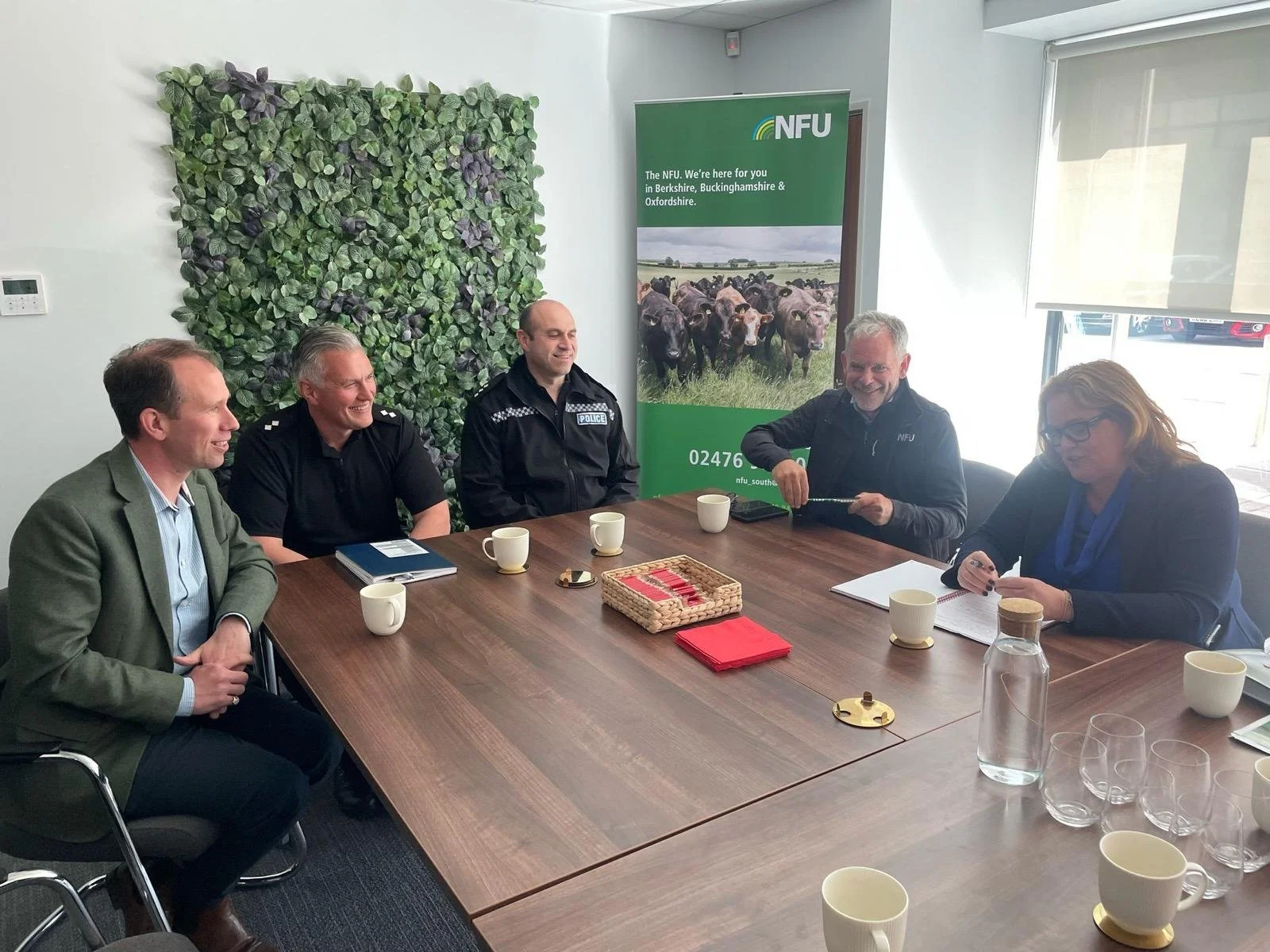Rural crime falls by 17% across the Thames Valley
Data from Thames Valley Police shows a downward trend in rural crime in the last financial year.
In the rural districts of West Oxfordshire, South Oxfordshire, and Vale of White Horse, the decrease was 36% in the first quarter of this year compared to the same quarter last year, demonstrating the impact of the work done by Community Safety Partnerships, Thames Valley Police, the Police and Crime Commissioner, the National Farmers’ Union, and farmers.
Rural Crime Action Week (8 to 12 September) aims to put victims at the heart of the national conversation. Often isolated and unheard, victims of rural crime face unique challenges that are too easily overlooked. Rural crime is an issue for large areas of the country, but it tends to go unreported. It can impact insurance premiums, food prices, and damage local communities. Each year, Thames Valley Police supports the National Operational Rural Crime Week, during which they increase the spotlight on operations to prevent and disrupt crime in rural communities.
Thames Valley Police and Crime Commissioner Matthew Barber said: “I made tackling rural crime a priority when I was elected, and now Thames Valley has an outstanding Rural Crime Taskforce, which has conducted hundreds of investigations and provided invaluable crime prevention advice to rural residents. This concerted effort is clearly having an impact, leading to the downward trend in rural crime trend we are now witnessing thanks to our funding and our commitment to support farmers.”
The Thames Valley Rural Crime Taskforce, launched in March 2022, consists of a dedicated team of officers and intelligence specialists. Their mission is to make the Thames Valley a hostile place for those committing rural crime. By working closely with partners and local communities, the taskforce is helping to combat serious organised rural crime and enhance safety in rural areas. This taskforce has recovered over £8 million worth of stolen goods, including £4 million in 2024 alone. This includes 88 caravans, 441 motor vehicles, and 63 items of plant and machinery. The team earned national recognition, including the Rob Oliver Award for excellence in vehicle theft prevention. In 2024, the Taskforce completed 566 investigations, made 245 arrests, and achieved a 29% positive outcome rate.
Protecting isolated communities and decreasing the costs of rural crime
The PCC also funded a Rural Crime Advisor within Thames Valley Police, working to promote rural crime prevention and increase engagement with rural communities, including local farmers and groups such as Young Farmers and the National Farmers Union. Over a 15-month period, 400 farms received a visit from the police and benefited from target-hardening, increasing security on local farms, exceeding provisional targets threefold.
The “Safer Streets Rural Project” focused on community engagement, target hardening, and proactive patrols. Residents were advised to be vigilant, to keep equipment under lock and key, and, where possible, to mark property.
Rural Crime Taskforce lead Inspector Stuart Hutchings said: Working in partnership with our rural communities and stakeholders, the Rural Crime Taskforce is committed to creating a hostile environment for those who seek to offend in our countryside. Our focus on organised criminality has revealed how offenders will travel significant distances to target rural areas. Regardless of where they operate, we will pursue them relentlessly and work across borders to bring them to justice”.
Nathan Boyd, County Adviser for Berks, Bucks and Oxon for the NFU said: “The Rural Crime Taskforce has worked hard to reduce crime and rebuild the trust of farmers and the wider rural community. With dedicated staff, including the Rural Crime Adviser, there are now more contact points and greater accountability. This has given farmers confidence to report crimes, knowing there will be a response and follow-up. Ongoing support for rural neighbourhood teams and the taskforce will continue to strengthen security for farmers and rural communities alike. The NFU will continue to work with the police and others on the issues facing our members and push for additional and extended legislation to help protect family farms, livestock and machinery”.
Last year, Matthew Barber partnered with the PCCs of Hampshire and Wiltshire to address cross-border rural crime between counties affecting the theft of farming equipment, hare coursing, and poaching.
Rural crime encompasses a variety of offences such as environmental crime, theft, arson, and wildlife crime.
Criminal gangs exploit our local wildlife, environment, and communities, putting those who live and work in the countryside under threat. The NFU Mutual 2025 Rural Crime Report states: “In recent years we’ve seen rural crime becoming increasingly organised, serious and persistent in nature, with thieves willing to pull out all the stops to get what they desire, and sadly we saw that trend continue in 2024.” However, due to proactive intervention and collaboration with law enforcement, the estimated cost of rural crime decreased by 16.5% year-on-year, to £44.1m. In the South East, the cost of rural crime was £7.1m in 2024, according to NFU Mutual.
For more information on rural crime, visit: https://www.thamesvalley.police.uk/advice/advice-and-information/rc/rural-crime/.

